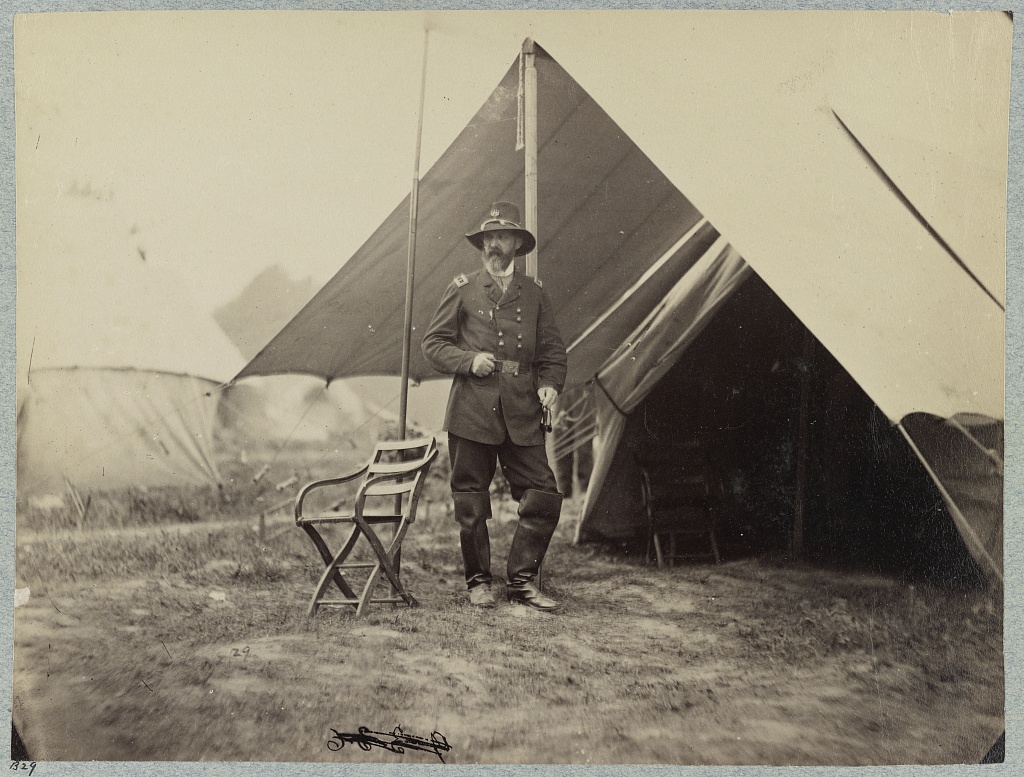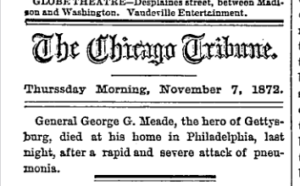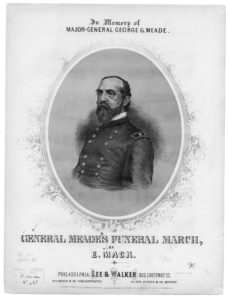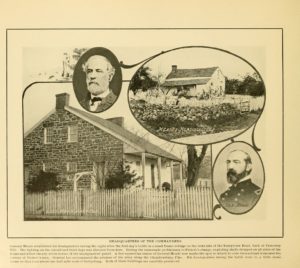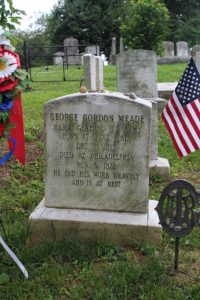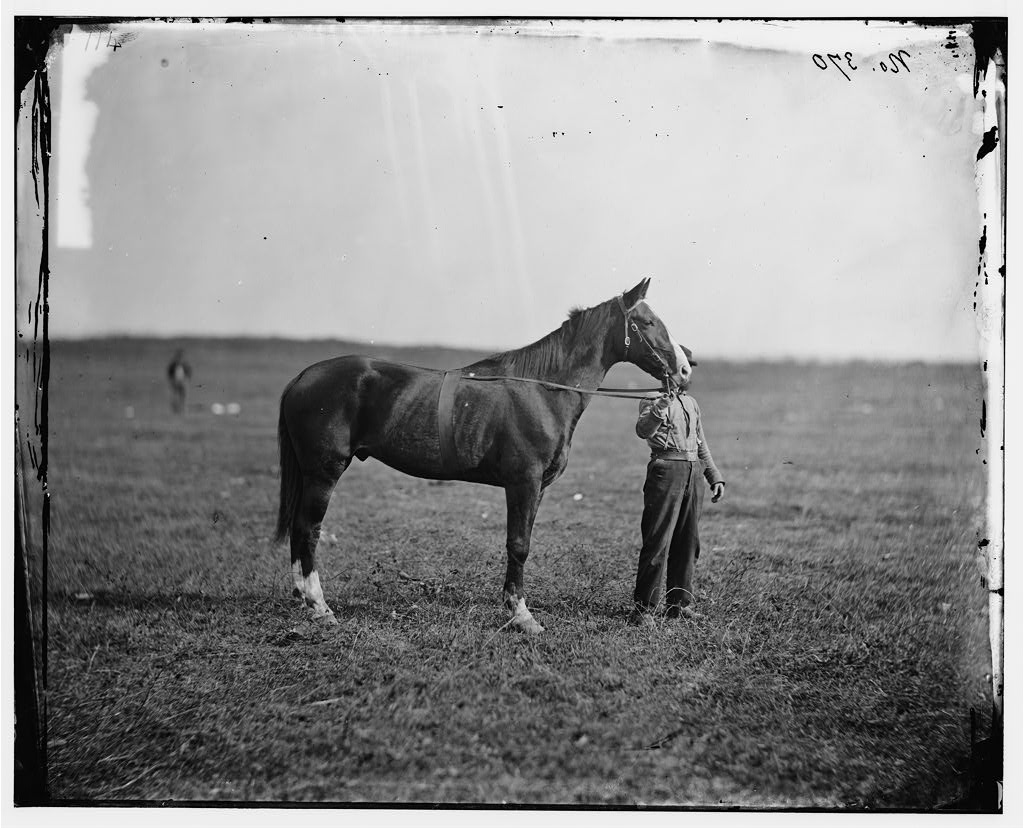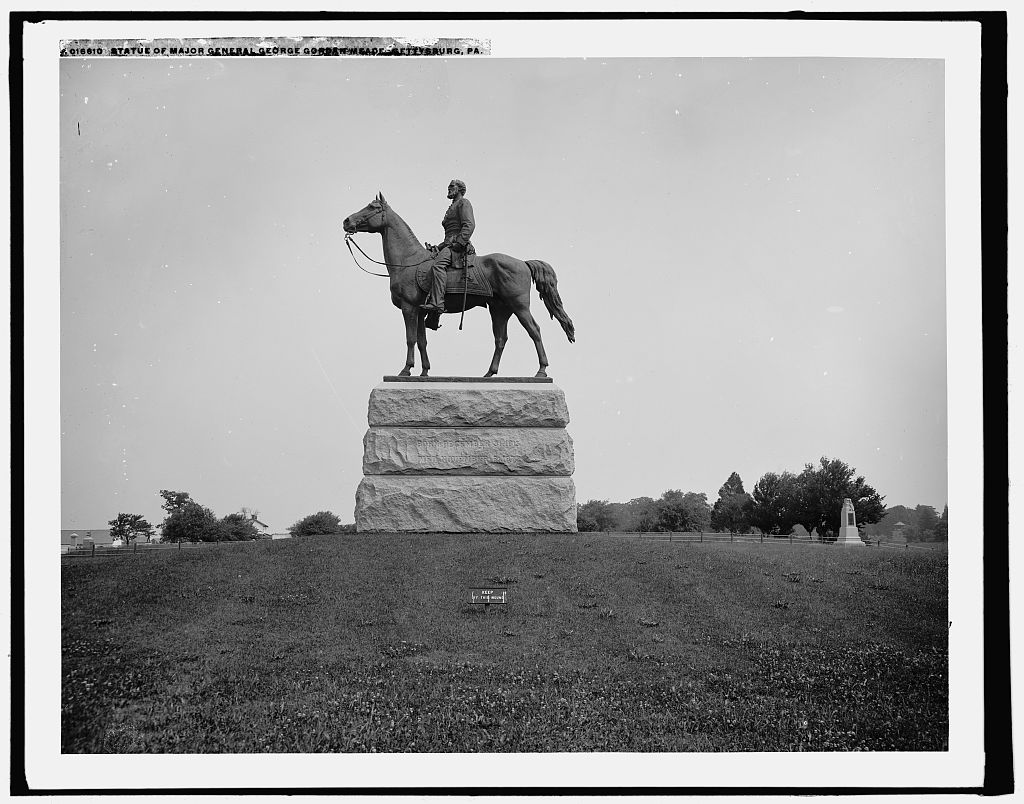The day after his Commander in Chief was re-elected United States President, General George Meade died at his Philadelphia home.
From The Chicago Daily Tribune November 8, 1872:
IN MEMORIAM.
Honors to the Late General Meade.
Washington, Nov. 7.—General Sherman has issued a general order, reviewing in a feeling manner the life and services of the late General Meade, and directing General McDowell, at New York, to make all arrangements for the funeral, and directing that at all military posts on that day flags be displayed at half-mast, and minute guns fired, and that the officers wear the usual badge of mourning.
It is understood that either Brigadier General A. H. Terry, now commanding the Department of the South, or E. R. S. Canby, commanding the Department of Columbia, will be appointed Major General, in place of General Meade, deceased.
General Sherman to-day telegraphed to General McDowell to proceed to Philadelphia, and consult with Mrs. Meade in relation to the arrangements for the funeral of her late husband. President Grant will attend the services.
PHILADELPHIA. Nov. 7.—At a meeting of the Commercial Exchange, to-day, appropriate resolutions were passed, relative to the death of General Meade. The Mayor will submit a message to the Councils this afternoon, recommending appropriate action to be taken.
NEW YORK, Nov. 7.—The flags throughout the city are at half-mast, in respect to the late General Meade.
The Society of the Army of the Potomac has forwarded a letter of condolence to the son of the late General Meade.
Special Despatch to The Chicago Tribune.
NEW YORK, Nov. 7. —The Philadelphia papers say of General Meade’s last illness : Up to Thursday last, he was in tho enjoyment of his usual good health. On that day he was attacked with pains in the chest and was compelled to take to his bed. His physician was called in, who found him suffering from an attack of pneumonia, the left lung being the point affected. On Monday, the disease showed alarming symptoms,and the General gradually grew worse, until death put an end to his sufferings, about half past 6 o’clock last evening. When he began to grow worse, Dr. Neill called in for consultation two other physicians, but their united skill was of no avail. He was perfectly conscious up to the time of his dissolution. When he breathed his last, he was surrounded by the members of his family. Two years ago, the General suffered a severe attack of the same disease, from which he rallied, but, as it seems, without the full recovery that was supposed.
From Harper’s Weekly November 23, 1872 (page 907):
GENERAL MEADE.
THE battle of Gettysburg is considered the turning battle of the war, and General MEADE was the hero of Gettysburg. Those who have heard him tell the tale of his appointment to the command of the Army of the Potomac and of that prolonged and cruel battle—of which the most elaborate and satisfactory account is that in Mr. EVERETT’S oration at the dedication of the cemetery—will always recall with admiration the manly modesty of the soldier and the vivid interest of the story. At the age of twenty-one he entered the Academy at West Point, and from that time until his death, although for a short period withdrawn from the army, he was in the military service of the country. During the late war he was constantly in action, and was always brave, skillful, and distinguished. In the final operations before Richmond he was General GRANT’S immediate lieutenant. The general said that he tried to leave him as independent as possible in command of the Army of the Potomac, and added that he always found him to be “the right man in the right place.”
For some time after the war General MEADE commanded the third military district—Georgia, Florida, and Alabama; but for the last three or four years he has been at the head of the Atlantic military division, living in Philadelphia. His reserve and moderation of manner, blended with a keen intellectual perception and ample knowledge, made him always a welcome and delightful companion. Hearty, generous, sympathetic, and, in the truest sense, a gentleman, General MEADE’S death will be widely deplored, as his memory will be gratefully honored as that of one of the ablest and most efficient of our great military chiefs in the war for the Union.
General Meade’s well-known Civil War horse, Old Baldy lived ten years longer than the general: “He was moderately active in retirement and Meade rode the horse in several memorial parades. His last parade was as the “riderless horse” in the funeral procession of his master, in November 1872. Baldy lived another 10 years. He was euthanized on December 16, 1882, at the age of 30, when he became too feeble to stand.” On July 2, 1863 Baldy was wounded and refused to move forward, so he had to be sent to rear for recuperation.
[November 7, 2022: Wikipedia’s article about George Gordon Meade provided a link to the November 12, 1872 New York Times article detailing General Meade’s funeral on the 11th. On the procession from the church, “The horse of the deceased was led by two sergeants of cavalry.” It was very long procession and included President Grant, General Sherman and McDowell.]

